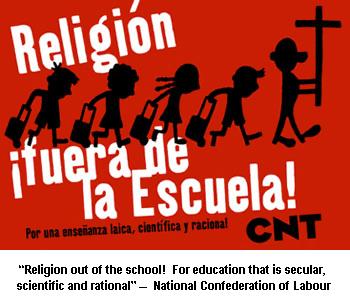 Concordat challenged before the Constitutional Court (2009)
Concordat challenged before the Constitutional Court (2009)
A Spanish judge questioned the legality of the Concordat before the Constitutional Tribunal. His ruling says the State cannot delegate education to the Church.

Judge questions the legality of the Concordat before the Constitutional Court
The ruling says the State cannot delegate education to the Church.
Jesús Bastante - Madrid - Publico, 9 May 2009
http://www.publico.es/espana/224345/juez/cuestiona/legalidad/concordato/tc
The church-state agreements signed in 1979 [four concordats] could be formally invalid, on the grounds of incompatibility with certain constitutional rights simply on formal grounds. This is the opinion of the head of the Social Court 34 in Madrid, Antonio Seoane, who has raised this question of unconstitutionality before the Constitutional Court.
The judge considered that much of the Concordat, especially in regard to religion classes and its consequences for teachers' rights does not conform to the Constitution.
In a ruling that has been made public, but not yet decided by the High Court, the judge ruled in favour of the request of some teachers of religion who felt that it was a violation of their labour rights not to be treated equally with other teachers with regard to "the payment of three years" and the recognition of their seniority.
Invalid consequences [of the education concordat]
Although the ruling does not take into account the time when these rules were adopted (the Concordat was negotiated along with the [1978] Constitution, but was signed on January 3, 1979), it falls squarely within the interpretation of their legal validity. For the judge, "the development of the rights contained in Article 27 (of the Constitution, concerning the right to an education in values), no true development" in terms of Catholic confession. [Article 27.3: The public authorities guarantee the right of parents to ensure that their children receive religious and moral instruction in accordance with their own convictions.]
Thus, according to Judge Seoane, it is not acceptable that, as noted in the church-state agreement, the subject of Catholic Religion be taught "in a position comparable to the other core disciplines." [Article 2] The judge also criticised the fact that "religious instruction is taught by people who, for each school are chosen by the academic authority from among those proposed by the Diocesan Ordinary." [Article 3]
Also inappropriate is the article of the Church-State agreement providing that "it shall be the responsibility of the Church Hierarchy to decide the contents of Catholic teaching and training courses, as well as to propose textbooks and educational material relative to said teaching and training." [Article 6]
The judge also does not agree with Article 7 of the Concordat, which establishes that the economic situation of teachers of religion will be agreed between the central government and the Conference of Bishops. This paragraph has denied job security for 30 years to the teachers who taught this subject, and allowed them to be "fired" (formally, "not renewed") by the Bishop without giving any reason.
State schools
While not dealing with the [general] relation of religion to the Constitution, according to the ruling "the whole system being implemented has no basis, including the presence in state schools of teachers of religion." Thus, the religion classes in state schools may not be legitimate.
According to the author of the ruling, the Concordat's concession to the Catholic Church allows it to administer the curriculum under conditions comparable to the other subjects which "are transfers of real competency in the area reserved by the Constitution for the government".
The main problem, according to the judge, is "the failure of a condition of validity, since Article 93 of the Constitution requires that international treaties are authorized by law", which "is a blatant breach in respect of the Agreements [concordats] of January 3, 1979." Therefore, the judge raises the point of unconstitutionality. [Article 93: Authorization may be granted by an organic act for concluding treaties by which powers derived from the Constitution shall be transferred to an international organization or institution. It is incumbent on the Cortes Generales or the Government, as the case may be, to ensure compliance with these treaties and with resolutions originating in the international and supranational organizations to which such powers have been so transferred.]







